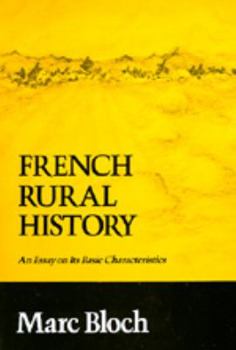French Rural History: An Essay on Its Basic Characteristics
Select Format
Select Condition 
Book Overview
From the Preface by Lucien Febvre: MARC BLOCH'S Caracteres originaux de l'histoire ruralefranfaise, which was originally published at Oslo in 1931 and appeared simultaneously at Paris under the imprint Belles Lettres, has long been out of print. As he told me on more than one occasion, he had every intention of bringing out another edition. In Marc Bloch's own mind this was not simply a matter of reissuing the original text. He knew, none better,...
Format:Paperback
Language:English
ISBN:0520016602
ISBN13:9780520016606
Release Date:January 1970
Publisher:University of California Press
Length:312 Pages
Weight:0.86 lbs.
Dimensions:0.8" x 5.5" x 8.2"
Related Subjects
Agricultural Sciences Europe France History Nature Science & Math Social Science Social SciencesCustomer Reviews
3 ratings
Forced to Read, but Worth the Effort
Published by Thriftbooks.com User , 14 years ago
I was told I needed to read this in grad school as medievalist focusing on rural areas. I had read Bloch's Feudal Society and enjoyed it, but French rural life? in the end, I found things that I have used in teaching throughout my career and am a better person to have read it. Bloch is lively, passionate and engaging--one could want no better guide to farming than he...in fact, after reading his work, it was difficult to think about what we do to the land today and what has een lost in the name of industrialized agriculture. A must for medieval grad students and a should-read for students of European history/culture, especially the sections on inheritance.
Scent of the earth
Published by Thriftbooks.com User , 14 years ago
Written in 1929, when Marc Bloch was 42 years young, page after page of this book infects with the exhuberance of a difficult project turning out well. Bloch chose to write a history of the social impact of economic events on everyday life. Back then that meant to take a long and winding road through uncharted territory. For documentary evidence on how the common people lived by working the land - on "oxen, wheeled ploughs or crop rotations" - was scarce and much of it had to be drawn from neighbouring disciplines. In the same year 1929, together with Lucien Febvre, Bloch founded the Annales School. And, to stay within the agrarian metaphor, this book is the seed that led to George Duby's Rural Economy and Country Life in the Medieval West, Braudel's The Identity of France and Le Goff's Medieval Civilization 400-1500, just to mention some of its greatest fruits. Founding stone of a difficult project - and what a project it turned out to be!
Explains the often undocumented evolution of rural societies
Published by Thriftbooks.com User , 25 years ago
I read the Spanish translation of this book for a graduate course and it became a crucial reference for other scholarly work I am doing now. While urban history is often well documented, rural history is a huge question mark. As a result, most of the history we know is that of urban societies. Bloch's work is outstanding, since he decides to reconstruct history from the evidence still left in the present. He "moves backward in the line of history" and uses all types of evidence available to "record change". Change, he says, is the only evidence left of rural history. For example, he researches how people organized agricultural parcels, how they named their towns, why and how they mark their territories, how different agricultural activites coexisted, what where their agricultural techniques, and their rationale... And, while doing that, he reconstructs the imperatives of these medieval times, the crucial forces acting upon people in their often isolated communities. Most important, he addresses why and how these practices changed. Through these changes, he is able to document history. Events that although crucial, were not recorded in history books, in archives, in chronicles, etc. Still, they had paramount importance in the evolution of French society. This book is universal, since it allows us to understand not only French history, but overall rural history as well. For example, one can understand how medieval agricultural practices had an impact in the long and narrow shape of the plots of land parceled in the initial settlements of the United States. In addition, it shows us that change is very slow, and that many elements of medieval society are still with us today.





